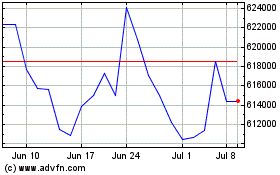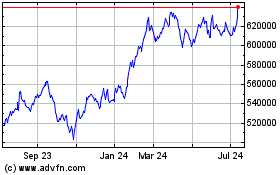Is Tesla or Exxon More Sustainable? It Depends Whom You Ask
September 17 2018 - 12:28PM
Dow Jones News
By James Mackintosh
Is Elon Musk's electric-car maker Tesla the best, the worst or a
merely middling performer on environmental issues? Is Warren
Buffett's Berkshire Hathaway one of the worst-governed big U.S.
companies? Is General Motors one of the most socially aware
businesses, or one of the least?
Investors picking a scoring system for ESG -- environmental,
social and governance -- issues facing companies can have any of
those outcomes.
The differences are easy enough to understand if you dig into
the details. Yet, they show just how difficult it is to take a
simple approach to ESG investing, a style that is becoming
ever-more popular. In addition to the billions of dollars of
exchange-traded funds based on ESG indexes, increasingly fund
managers are being pushed to produce portfolios with better ESG
ratings, encouraged by public mutual-fund ESG scores.
The problem here isn't the ESG ratings, but that they are used
as though they were some sort of objective truth. In reality they
are no more than a series of judgments by the scoring companies
about what matters -- and investors who blindly follow their scores
are buying into those opinions, mostly without even knowing what
they are.
To illustrate these differences, we can dig into the scores
given to five big companies by FTSE Russell, MSCI and
Sustainalytics, all used for ESG indexes and by institutional
investors. The companies are Tesla, Berkshire, oil major Exxon
Mobil, Google-owner Alphabet and carmaker General Motors.
Perhaps the biggest surprise is Tesla, ranked by MSCI at the top
of the industry, and by FTSE as the worst carmaker globally on ESG
issues. Sustainalytics puts it in the middle.
The explanation comes down to what is measured, and how the
measurement is affected by disclosure.
MSCI gives Tesla a near-perfect score for environment, because
it has selected two themes as the most important for the car
industry: the carbon produced by its products, and the
opportunities the company has in clean technology.
FTSE gives Tesla a "zero" on environment, because its scores
ignore emissions from its cars, rating only emissions from its
factories (to confuse things further, FTSE's separate "Green
revenue" score gives Tesla 100%).
Tesla highlights another major difference in scoring: what to do
when a company doesn't disclose. FTSE says it has to assume the
worst if no information is provided about issues that matter to a
company -- and that giving it the worst score encourages more
disclosure.
Tesla, which discloses little about its operations compared with
other automakers, suffers from FTSE's approach, particularly on
social issues (where all three graders anyway give it low scores on
how it treats workers). MSCI is more generous, assuming that if
there's no disclosure the company operates in line with regional
and industry norms. Sustainalytics declined to explain its
methodology, but it gives points for disclosure of policies --
again, Tesla suffers -- as well as low scores for issues where
there is too little disclosure to calculate, such as Tesla's
renewable-energy use.
Berkshire suffers on disclosure too, again being zeroed by FTSE
on both environment and social scores.
Another problem is how to put the separate environmental, social
and governance scores together. Should a highly polluting company
be able to offset that by having great governance and treating
workers well? Sustainalytics ranks Exxon top of the five companies
overall, because it puts a 40% weight on social issues, where Exxon
does well thanks to strong policies for its workers, supply chain
and local communities. MSCI ranks Exxon fourth of the five in part
because it puts a 51% weight on environment and only 17% on social
issues.
The three create their scores differently, too. MSCI selects --
using rules -- a small number of factors that matter to each
company, making each important to the overall score. FTSE includes
a broader set of factors, but is still rules-based. Sustainalytics
also has a broad set of factors, and uses analyst judgments for
some of its assessments. In all three cases the design of the rules
and scoring system makes a big difference to the outcome.
And sometimes the assessments simply differ. MSCI puts Alphabet
in the bottom quartile of its industry for the subcategory of
corporate governance thanks to controlling shareholders and
related-party transactions, although its overall governance score
is lifted by a strong score on "corruption and instability" issues.
FTSE takes the opposite approach, putting Alphabet in the top half
of its peer group for governance, and says it is held back in part
by a weak score for anticorruption assessments and training, as
well as tax disclosure.x`
Investors should not treat ESG scores as settled facts to be
used on their own, but as potentially worthwhile analysis that
needs to be understood before being acted on. The thick ESG reports
behind the scores offer useful detail about the policies and
controversies around each business. But just as with financial
accounts, investing without understanding is unlikely to deliver
what you want.
Write to James Mackintosh at James.Mackintosh@wsj.com
(END) Dow Jones Newswires
September 17, 2018 12:13 ET (16:13 GMT)
Copyright (c) 2018 Dow Jones & Company, Inc.
Berkshire Hathaway (NYSE:BRK.A)
Historical Stock Chart
From Mar 2024 to Apr 2024

Berkshire Hathaway (NYSE:BRK.A)
Historical Stock Chart
From Apr 2023 to Apr 2024
